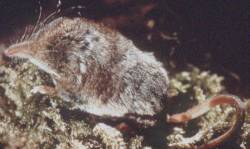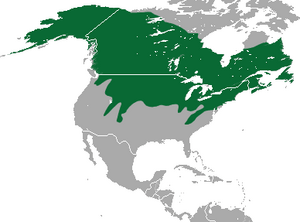Cinereus shrew facts for kids
Quick facts for kids Cinereous shrew |
|
|---|---|
 |
|
| Conservation status | |
| Scientific classification | |
| Genus: |
Sorex
|
| Species: |
cinereus
|
 |
|
| Cinereus shrew range | |
The cinereous shrew (Sorex cinereus) is a type of shrew. It is found in Alaska, Canada, and the northern United States. It is also called the masked shrew or the common shrew.
Description
It is grey-brown in colour. It light grey belly and a pointed snout. It has a long tail. Its body is about 9 cm in length including a 4 cm long tail. It weighs about 5 g. They can live up to two years.
Distribution
It lives in most of northern and southern North America to the Rocky Mountains in the west, and to the Appalachians in the east. This species was introduced into Newfoundland in the late 1950s. It can be found in many types of habitats like arid grasslands, places with lots of water, woodlands, and tundra. It mostly lives in humid places and with lots of plants to hide in.
Feeding
Cinereus shrews eat insects, worms, snails, small rodents, salamanders, and seeds. They can only live for a few hours without food because of their high metabolism.
Predators
Predators include larger shrews, hawks, owls, shrikes, snakes, herons, foxes, leopard frogs, bluebirds, brown trouts, and weasels.
Behavior
The cinereus shrew can be diurnal or nocturnal depending on the weather. It digs tunnels but also uses tunnels made by other small mammals. It uses dry grass to make nests in these tunnels. It does not like other shrews to come into its territory.
Reproduction
Cinereus shrews breed from May to September. Females give birth to 6 to 7 young ones. The young ones are born hairless and do not have claws. They become sexually mature at two months. But they wait until their first spring to breed.
Images for kids



